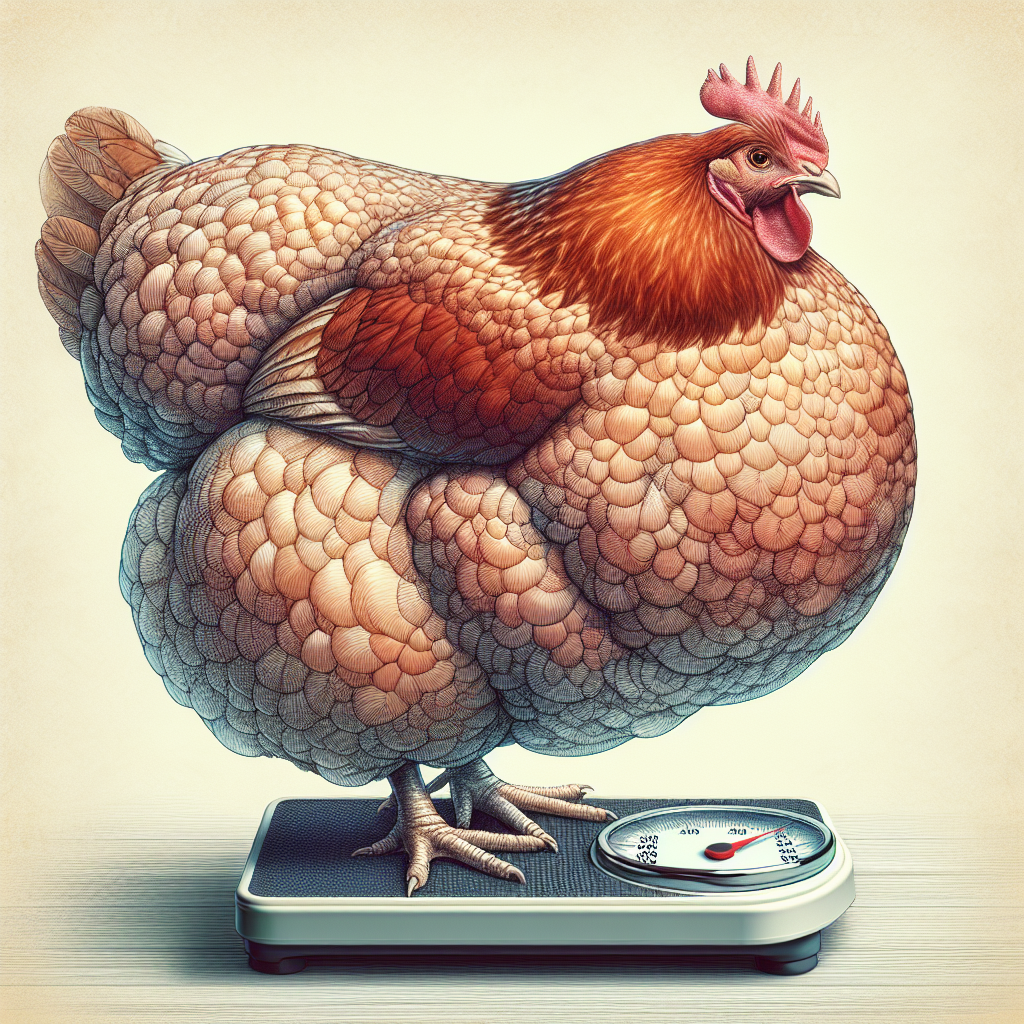If you’ve noticed that your flock is sporting a few extra pounds or showing signs of obesity, you may be wondering how to tackle this weight issue. Whether you have a flock of chickens, ducks, or any other feathered friends, it’s important to address their weight to ensure their overall health and well-being. In this article, we’ll explore some helpful tips and strategies to help you address obesity or weight issues in your flock and keep them happy and healthy.
Understanding Obesity in Poultry
Obesity in poultry is a growing concern among flock owners and keepers. It refers to an excessive accumulation of body fat in birds, which can have serious health implications. Understanding the causes, health risks, and methods of identifying obesity is crucial for maintaining the overall well-being of your flock.
Causes of obesity in poultry
There are several factors that contribute to the development of obesity in poultry. A primary cause is an imbalance between the energy intake and expenditure of birds. When chickens consume more calories than they burn through physical activities and metabolic processes, the excess energy is stored as fat.
Genetics also play a role in the susceptibility of birds to obesity. Some breeds are more prone to gaining weight than others. Additionally, factors such as age and gender can influence the likelihood of developing obesity in poultry.
Health risks associated with obesity in poultry
Obesity in poultry can have detrimental effects on their health and overall quality of life. Birds that are overweight are at a higher risk of developing various diseases, including fatty liver syndrome, heart disease, and joint problems. They may also experience reduced mobility and reproductive issues.
Furthermore, obese poultry often have compromised immune systems, making them more susceptible to infections and diseases. All these health risks highlight the importance of addressing obesity in your flock.
Identifying obesity in your flock
To effectively manage weight issues in your flock, it is crucial to be able to identify obesity accurately. Some common signs of obesity in poultry include a rounded or bulging abdomen, difficulty moving or walking, and increased panting or breathlessness. You can also compare the weight of individual birds to breed standards or use a body condition scoring system to assess their body fat levels.
Regularly monitoring the body weight and condition of your birds, along with consulting a poultry veterinarian, can help you detect and address obesity at an early stage.
Diet and Nutrition for Weight Management
A balanced diet is essential for maintaining optimal weight in poultry and preventing obesity. Providing the right amount and quality of food can significantly impact the overall health and weight of your flock.
Balanced diet for poultry
Offering a well-balanced diet is key to managing weight in poultry. Their diet should consist of a combination of complete and balanced commercial feed, fresh vegetables, fruits, and grains. It is important to ensure that the feed is specifically formulated for the nutritional needs of your birds and does not contain excessive amounts of fat or calories.
Controlling portion sizes
Controlling portion sizes is crucial in maintaining a healthy weight for your flock. It is vital to provide enough food to meet their nutritional needs without overfeeding. Overeating can quickly lead to weight gain and obesity. By carefully measuring and monitoring the amount of feed given to each bird, you can ensure that they receive an appropriate portion size.
Introducing healthy treats
While treats can be a great way to bond with your flock, it is essential to choose healthy options that will not contribute to weight gain. Avoid offering high-calorie and fatty treats, such as bread or sugary snacks. Instead, opt for fresh fruits and vegetables, which are not only nutritious but also low in calories. Introducing these healthy treats in moderation can help prevent boredom without significantly impacting the overall weight of your birds.
Supplementing with vitamins and minerals
Vitamins and minerals play a vital role in maintaining the health and well-being of your flock. If you are providing a balanced diet, your birds should receive most of the essential nutrients they need. However, depending on their specific requirements, you may need to supplement their diet with additional vitamins and minerals. Consult with a poultry veterinarian to determine if any supplements are necessary for your flock’s weight management.
Exercise and Physical Activity
Just like in humans, exercise and physical activity are essential for the overall health and weight management of poultry. Engaging your flock in regular exercise helps burn calories, promotes muscle development, and enhances their overall well-being.
Encouraging free-range activities
Allowing your birds to engage in free-range activities is an excellent way to promote exercise and physical activity. Giving them access to a spacious outdoor area where they can roam freely encourages natural behaviors like scratching, pecking, and foraging. This not only provides mental stimulation but also helps burn off excess calories.
Providing ample space for movement
Even if free-ranging is not possible, it is crucial to provide your birds with ample space in their enclosure to move around. Overcrowding can result in limited mobility and reduced opportunities for exercise. Ensure that the coop and run are large enough to accommodate the size and number of birds in your flock, allowing them to move and stretch their wings freely.
Introducing stimulating toys and objects
To keep your birds active and engaged, consider introducing stimulating toys and objects in their environment. Items such as perches, swings, and hanging treats can encourage physical activity and mental stimulation. These toys provide opportunities for your birds to climb, jump, and play, promoting exercise while alleviating boredom.
The Role of Environmental Factors
Creating an optimal environment for your flock is essential for their overall health and well-being. Environmental factors such as temperature, ventilation, stress levels, and cleanliness can significantly impact their weight and susceptibility to obesity-related issues.
Optimizing temperature and ventilation
Maintaining an appropriate temperature and proper ventilation in the coop is crucial for the comfort and health of your birds. Extreme temperatures can increase stress and impact feed intake, ultimately affecting their weight. Provide proper insulation and ventilation to ensure a comfortable environment that promotes optimal weight management.
Reducing stress levels
Stress can have a negative impact on the weight and health of your flock. Chronic stress affects the hormonal balance of birds, potentially leading to weight gain or loss. Minimize stress by providing a quiet and calm environment, minimizing sudden loud noises or disturbances, and ensuring sufficient space for each bird.
Maintaining cleanliness and hygiene
Maintaining a clean and hygienic environment is crucial for preventing various health issues, including obesity. Regularly clean the coop, removing any accumulated droppings, feathers, or uneaten food. Proper sanitation helps minimize the risk of bacterial and parasitic infections, which can contribute to weight problems in birds.
Managing Weight Issues in Different Flock Stages
Managing weight issues requires different approaches depending on the stage of development of your flock. Addressing obesity in chicks, maintaining healthy weight in pullets, implementing weight management strategies for adult birds, and considering special considerations for breeding birds are crucial aspects to consider.
Addressing obesity in chicks
Obesity can even affect chicks, so it is important to monitor their weight from the beginning. Providing a balanced diet specifically formulated for their nutritional needs, controlling portion sizes, and encouraging exercise through supervised play can help prevent excessive weight gain in chicks.
Maintaining healthy weight in pullets
Pullets, young female chickens before they start laying eggs, require careful weight management to ensure their future reproductive health. Balanced nutrition, portion control, and ample exercise opportunities are key to maintaining a healthy weight in pullets. Consult with a poultry veterinarian for specific feeding and management recommendations for this stage.
Weight management for adult birds
Adult birds require a consistent and balanced diet to maintain a healthy weight. Regular monitoring, controlled portion sizes, and providing opportunities for exercise and activity are crucial in preventing obesity. Additionally, consulting with a poultry veterinarian can help establish the ideal weight range for your specific breed and age group of adult birds.
Special considerations for breeding birds
Breeding birds have unique nutritional requirements, especially during the breeding season. Maintaining an ideal weight is crucial for their reproductive success. Consult with a poultry veterinarian or an experienced breeder to develop a customized feeding and management plan that supports the fertility and overall health of your breeding flock.
Monitoring and Record-keeping
Regular monitoring and record-keeping are essential components of effective weight management in poultry. By establishing a routine for weighing your birds, maintaining weight records, and tracking their feed consumption, you can identify trends, detect weight fluctuations, and make necessary adjustments to your management strategies.
Establishing a regular weighing routine
Establishing a regular weighing routine allows you to track the weight of your birds consistently. Weighing them at the same time each week or every few weeks provides a reliable means of monitoring their weight changes over time. This information is vital for adjusting their diet and exercise regimen accordingly.
Maintaining weight records
Keeping detailed weight records helps you track the progress of your flock and identify any weight-related issues. Maintain individual records for each bird, noting their weight, date, and any significant changes in their health or behavior. These records will serve as a valuable reference for identifying patterns and making informed decisions about their weight management.
Tracking feed consumption
Monitoring and tracking the feed consumption of your flock is crucial for managing their weight effectively. Keep a log of the amount of feed provided to each bird or the total amount consumed by the entire flock each day. This record can help you assess their feeding habits, adjust portion sizes, and identify any overeating or under-eating patterns.
Working with a Veterinarian
Collaborating with a poultry veterinarian is highly recommended for addressing weight and health issues in your flock. Their expertise and guidance can provide valuable insights into proper nutrition, exercise, and overall flock management.
Consulting a poultry veterinarian
When dealing with weight issues or obesity in your flock, it is essential to consult a poultry veterinarian. They can assess the overall health of your birds, provide specific recommendations for weight management, and answer any questions or concerns you may have. A professional consultation can help develop a tailored plan to address weight issues effectively.
Performing health assessments
A poultry veterinarian can perform health assessments on individual birds or the entire flock to identify any underlying health conditions that may be contributing to weight gain or loss. They can assess body condition, conduct diagnostic tests, and recommend appropriate treatments or interventions to address weight issues. Regular health assessments are essential for maintaining the well-being of your flock.
Seeking professional advice
If you are unsure about the best approach to managing weight issues in your flock, do not hesitate to seek professional advice from a poultry veterinarian. They have extensive knowledge and experience in poultry health and can provide practical recommendations based on your specific circumstances. Professional guidance ensures that you are taking the most effective steps to address weight issues and optimize the health of your flock.
Preventing and Managing Common Health Issues
Addressing weight issues in your flock also involves preventing and managing common health issues associated with obesity. By taking proactive measures, you can minimize the risk of these complications and maintain the well-being of your birds.
Preventing fatty liver syndrome
Fatty liver syndrome is a common health issue observed in obese poultry. To prevent this condition, ensure a balanced diet with appropriate levels of fat and carbohydrates. Avoid feeding excessive amounts of high-energy food and opt for feed specifically formulated to promote liver health. Regular exercise and weight management also play a crucial role in preventing fatty liver syndrome.
Addressing joint and mobility problems
Obesity in poultry can lead to joint problems, reduced mobility, and increased strain on their skeletal structure. To address these issues, prioritize weight management and provide opportunities for exercise and activity. Ensure that the coop and outdoor areas are conducive to mobility, and consider integrating joint supplements into the diet, especially for older birds.
Managing other weight-related health issues
Obesity can increase the risk of various other health issues in poultry, such as heart disease, respiratory problems, and reproductive disorders. Addressing weight issues through proper nutrition, exercise, and regular monitoring can help minimize these risks. Consult with a poultry veterinarian for specific recommendations based on your flock’s breed, age, and overall health status.
Educating Flock Owners and Keepers
Educating flock owners and keepers about weight management is crucial for promoting awareness and responsible flock management. By providing resources, guidelines, and support, you can empower others to take proactive steps in maintaining flock health.
Providing information on weight management
Make educational resources readily available to flock owners and keepers, covering topics such as nutrition, exercise, and weight management. These resources can be in the form of brochures, online articles, or workshops. Focus on the importance of a balanced diet, portion control, and regular exercise in maintaining optimal weight for poultry.
Sharing resources and guidelines
Share guidelines and best practices with flock owners and keepers to help them implement effective weight management strategies. These guidelines can include feeding recommendations, exercise techniques, and tips for monitoring and tracking weight. By sharing valuable resources, you can support and educate others in their journey toward better flock management.
Promoting awareness and education
Organize workshops, webinars, or community events to promote awareness and education about weight management in poultry. Engage with local poultry groups, forums, or social media platforms to create a dialogue and share knowledge. By raising awareness about the importance of managing weight in poultry, you can inspire others to take proactive measures in their own flocks.
Continuous Evaluation and Adjustment
Continuous evaluation and adjustment are vital for long-term weight management in poultry. Regularly monitoring the health and weight of your flock, making necessary changes to the management plan, and seeking ongoing support and guidance will contribute to the overall success of your weight management efforts.
Regularly monitoring flock health
Maintain a routine of regularly monitoring the health and weight of your flock. Check for signs of obesity or weight fluctuations and make adjustments to their diet and exercise routines accordingly. This consistent evaluation helps identify any emerging issues and allows for prompt intervention.
Making necessary changes to the management plan
As your flock’s needs evolve, it is crucial to make necessary changes to your management plan. Adjust portion sizes, modify feed formulations, or introduce new exercise opportunities based on the specific requirements of your birds. Adapting the plan as needed ensures that your flock’s weight management strategies remain effective over time.
Seeking ongoing support and guidance
Weight management in poultry can be a complex process, and seeking ongoing support and guidance is essential. Engage with poultry forums, online communities, or local poultry associations to connect with experienced flock owners and seek advice based on their practical knowledge. Continuous support and guidance from fellow enthusiasts can enhance your understanding and implementation of effective weight management strategies.
In conclusion, addressing obesity and weight issues in your poultry flock requires a comprehensive approach that includes understanding the causes and health risks, implementing proper diet and nutrition, promoting exercise and physical activity, optimizing environmental factors, managing weight issues in different flock stages, monitoring and record-keeping, and working with a poultry veterinarian. By continuously evaluating, adjusting, and educating yourself and others, you can provide the best care for your flock and promote their overall health and well-being.




